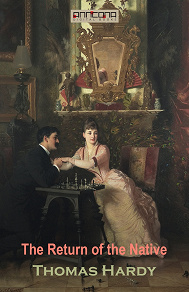
Förlag: Anncona Media
Kategori:
Romaner Engelskspråkiga
Tillgänglig sedan: april 2016
The Return of the Native
The Return of the Native is English author Thomas Hardy's sixth published novel. It first appeared in the magazine Belgravia, a publication known for its sensationalism, and was presented in twelve monthly instalments in 1878. Because of the novel's controversial themes, Hardy had some difficulty finding a publisher; reviews, however, though somewhat mixed, were generally positive. In the twentieth century, The Return of the Native became one of Hardy's most popular novels.
The novel takes place entirely in the environs of Egdon Heath, and, with the exception of the epilogue, Aftercourses, covers exactly a year and a day.
Like all of Hardy's work, The Return of the Native is passionate and controversial, with themes and sympathies beyond what a good Victorian would ever admit. A modern and honest novel of chance and choice, faith and infidelities, this dark story asks what is free will and what is fate? What is the true nature of nature, and how do we fit together? Can we fit together?
A tragedy set in the barren land of Edgon Heath. Our heroine, Eustacia, is proud, passionate, cruel, fickle, avaricious, and desperate. She burns every life she touches, never able to find the mad love and exotic world she dreams of. Our supposed hero, Clym, is modest, steady, plain, moral, and dutiful. He is satisfied returning from Paris to the simple comfort of home.
Originally released as five books, in classic tragic form, a sixth, tacking on a 'happy ending', was added by editor and public pressure.
Thomas Hardy (1840-1928) was an English novelist and poet. A Victorian realist, in the tradition of George Eliot, he was also influenced both in his novels and poetry by Romanticism, especially by William Wordsworth.
Charles Dickens is another important influence on Thomas Hardy. Like Dickens, he was also highly critical of much in Victorian society, though Hardy focused more on a declining rural society.
Initially he gained fame as the author of such novels as Far from the Madding Crowd (1874), The Mayor of Casterbridge (1886), Tess of the d'Urbervilles (1891), and Jude the Obscure (1895). However, since the 1950s Hardy has been recognized as a major poet, and had a significant influence on The Movement poets of the 1950s and 1960s, including Phillip Larkin.
The bulk of his fictional works, initially published as serials in magazines, were set in the semi-fictional region of Wessex and explored tragic characters struggling against their passions and social circumstances. Hardy's Wessex is based on the medieval Anglo-Saxon kingdom and eventually came to include the counties of Dorset, Wiltshire, Somerset, Devon, Hampshire, and much of Berkshire, in south west England.
Information
Stöds av följande plattformar
PC/Mac
Surfplatta Läsplatta
Smartphone
